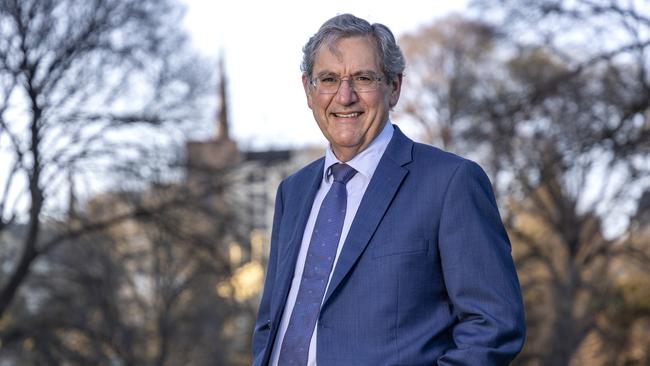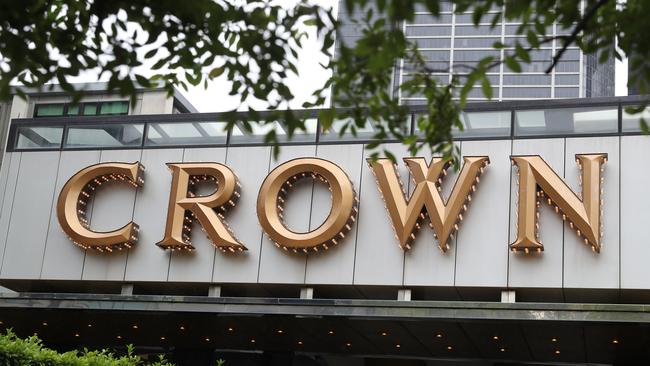ASIC chairman Joe Longo defends decision to issue ‘no further action’ letters to Crown directors and senior executives.
The ASIC chairman says he understands ‘people are disappointed’ but there were good reasons it took no action against Crown directors or senior executives, despite governance failures.

Business
Don't miss out on the headlines from Business. Followed categories will be added to My News.
The corporate watchdog chose not to take enforcement action against Crown Resorts directors and executives because the clock ran down, the quality of the evidence faded over an eight-year period, and the law prevented any hindsight examination of the questionable conduct.
In an address to a directors’ summit, ASIC chairman Joe Longo strongly defended the watchdog’s controversial decision to issue “no further action” letters to about 10 Crown directors and senior executives.
The move, revealed in the Margin Call column in The Australian on Wednesday, came despite a litany of governance failures identified in three inquiries, two of which have reported, as well as Austrac’s launch of civil penalty proceedings against Crown Melbourne and Crown Perth on Tuesday over systemic money-laundering breaches.
“I get it; people are very disappointed,” Mr Longo told The Australian, after addressing an Australian Institute of Company Directors summit in Melbourne.
“There have been three inquiries and clearly there were governance failures and expectations of those directors that weren’t met.
“But it’s quite a different thing to then sue them.”
Extensive reports on Crown’s misconduct have been issued in a NSW inquiry by former Supreme Court judge Patricia Bergin, which was triggered by the arrival of Hong Kong billionaire Lawrence Ho on the company’s share register, and a royal commission in Victoria led by ex-Federal Court judge Ray Finkelstein.
A report on Crown Perth by former Supreme Court judge Neville Owen is expected within days.

Issues under consideration have included whether any Crown director or officer had breached section 180 of the Corporations Act, which relates to acting with “care and diligence”.
ASIC has declined to reveal which former Crown figures received the no further action notices, but sources have said they were likely to include businessman Harold Mitchell, previously in strife with the regulator over his time at Tennis Australia, ex-AFL chief executive Andrew Demetriou, and one-time casino boss Ken Barton.
It is unclear whether James Packer, who was for a time the chairman of Crown, received a letter.
Mr Longo acknowledged there had been a lot of adverse findings made against successive Crown boards and the effectiveness of its governance.
However, this fell a long way short of sufficient evidence when a lot of the events under scrutiny occurred 8-9 years ago.
Memories faded with the passage of time, and relevant documents became more scarce.
“And secondly, the AML responsibilities, they’re on the company and Austrac’s taken action against the company.” the ASIC chief said.
“If the question is: “Well, why aren’t you going against the directors?”, I think you can pick up from my published remarks that I take going after directors pretty seriously.”
The test, he said, was whether an objective, dispassionate person thought the director had done the right thing, based on what they knew at the time.
Hindsight did not come into consideration.
While many people would think “yeah, I get that”, Mr Longo said it was actually very difficult to put into practice in Crown’s case, because there were a number of “very well written, passionate royal commission or commission of inquiry reports that paint a really awful picture”.
“And you say: “Well, there must be a cause of action against the individuals who are caught up in that,” he said.
“All I can say to this group here today is that because of the evidence, the age of the matter, the knowledge of the directors at the time, and all the circumstances, there wasn’t an actionable case against the directors.
“That was our call and it falls to me to talk about it as much as I can today.”
On the Austrac proceedings against Crown, Mr Longo stressed not only were they against the company, as opposed to the directors or executives, but they encompassed strict liability.
This meant there was no obligation to prove intent or negligence; just that the transgressions occurred.
“That’s why with AML they have those big fines - once you can show that a report wasn’t lodged (with Austrac), it doesn’t matter why it wasn’t; it’s an offence,” he said.
“So the Austrac legal regime has its own challenges, but it’s on the corporate (not the individual), and it’s strict liability.”
Mr Longo said one of his objectives at ASIC was to conduct investigations in real time.
“It’s a continuous challenge for law enforcement to investigate in real time, and to be able to detect whatever the issue is and make a decision to look at it fairly quickly, because it’s easier,” he said.
“Years go by and people’s recollections fade, they leave the county, they pass away, documents go missing.
“In this case, it didn’t help, frankly, that the conduct was so old.”
Mr Longo said in his address to directors that the most common situations that the regulator was looking at related to failures by directors to manage their company’s significant or strategic risks.
Recent investigations had shown that problems could arise from any activity undertaken by a company, and were not confined to situations where there had been financial loss.
They also included reputational damage.
Other non-financial risk issues included cyber resilience and climate-related disclosure, including misleading marketing or “greenwashing” by listed entities.
Risks, he said, were dynamic and evolving, and ASIC was “acutely aware” that a one-size-fits-all approach was not possible.
“The costs of consequences of poorly handled non-financial risks can be immense and, at times, catastrophic,” he said.
“However, establishing the structures and information flows within your control, getting the people and practices right so as to seek out the ‘known unknowns’ that might otherwise endanger your business, is a very achievable objective.”
More Coverage
Originally published as ASIC chairman Joe Longo defends decision to issue ‘no further action’ letters to Crown directors and senior executives.




